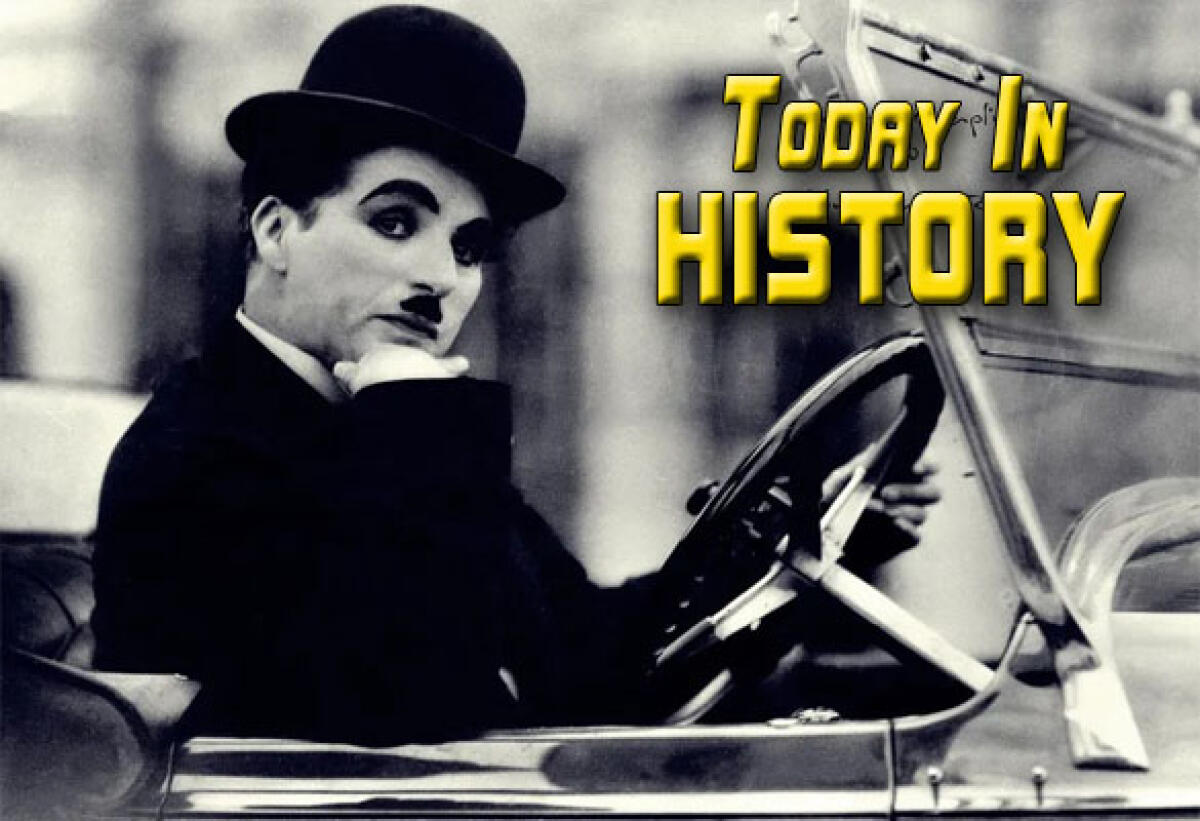- Thursday, 12 February 2026
- Have a HOT TIP? Call 704-276-6587 or E-mail us At LH@LincolnHerald.com
Today In History – September 18
There are 104 days remaining until the end of the year

Today in History in 1952 Charlie Chaplin leaves the United States and is barred, by J. Edgar Hoover, from ever entering the country again.
The On This Day In History archives at “Simple English Wikipedia, The Free Encyclopedia” contains over 200,000 events, birthdays and deaths from 6,000 years of history. Here is a roundup of a few of them:
September 18 is the 261st day of the year (262nd in leap years) in the Gregorian calendar. There are 104 days remaining until the end of the year.
EVENTS
41 - Tiberius is confirmed as Roman Emperor by the Roman Senate following the natural death of Augustus Caesar on August 19.
96 – Nerva becomes Roman Emperor, after the murder of Domitian.
324 - Constantine I decisively defeats Licinius in the Battle of Chrysopolis, establishing his own control over the whole Roman Empire.
1180 - Philip Augustus becomes King of France.
1502 – Christopher Columbus lands in present-day Costa Rica on his final voyage.
1635 - Ferdinand II, Holy Roman Emperor declares war on France.
1679 - New Hampshire becomes a county of the Massachusetts Bay Colony.
1714 - George I of Great Britain arrives in Great Britain for the first time since becoming King on August 1.
1739 - The Treaty of Belgrade is signed, giving Belgrade to the Roman Empire.
1759 - Seven Years' War: The British capture Quebec City.
1793 – The first cornerstone for the US Capitol building is laid by George Washington.
1809 - The Royal Opera House in London opens.
1810 – The process towards Chilean independence begins with the formation of the first government junta.
1812 - The 1812 Fire of Moscow dies down after destroying three quarters (75%) of the city.
1814 - The Congress of Vienna begins, with discussions on a new order in Europe.
1851 - First publication of what later becomes The New York Times.
1870 – The Old Faithful Geyser at Yellowstone is first observed by Henry D. Washburn.
1872 – Oscar II of Sweden and Norway becomes King.
1882 - The Pacific Stock Exchange opens.
1895 - Daniel David Palmer gives the first chiropractic adjustment.
1906 – A Typhoon and Tsunami kill around 10,000 people in Hong Kong.
1910 - 25,000 people demonstrate in Amsterdam for equal voting rights.
1911 - Russian Premier Pyotr Stolypin is shot at the Kiev Opera House.
1914 - The Irish Home Rule Act becomes law, but is delayed until after World War I.
1914 - World War I: South African troops land in what was then German South West Africa (now Namibia).
1919 – Women in the Netherlands gain the right to vote.
1922 - Hungary is admitted to the League of Nations.
1927 - The Columbia Broadcasting System (CBS) goes on the air.
1939 – World War II: The Polish government under Ignacy Moscicki flees to Romania.
1940 - World War II: British steamer City of Benares is torpedoed by German U-boat U-48 on Rockall sandbank, killing 248 people.
1947 – The U.S. Air Force is formed as a group split from the U.S. Army.
1947 – The CIA is founded.
1952 – Charlie Chaplin leaves the United States and is barred, by J. Edgar Hoover, from ever entering the country again.
1960 - Fidel Castro arrives in New York City as the head of a Cuban delegation of the United Nations.
1961 – UN Secretary-General Dag Hammarskjöld is killed in a plane crash in what is now the border region between Zambia and the Democratic Republic of the Congo, on his way to the war-torn Katanga region.
1962 – Rwanda, Burundi, Jamaica and Trinidad and Tobago join the UN.
1964 - Constantine II of Greece marries Anne-Marie of Denmark.
1964 - The North Vietnamese army begins infiltrating South Vietnam.
1970 – American guitarist Jimi Hendrix dies in London, aged 27.
1973 - East Germany, West Germany and the Bahamas join the United Nations.
1974 – Hurricane Fifi kills thousands of people in Honduras.
1975 – Newspaper heiress Patty Hearst is arrested.
1977 - Voyager 1 takes the first photograph of the Earth and the Moon together.
1981 - Capital punishment is banned in France.
1982 - Christian militia kill 600 Palestinians in Lebanon.
1984 - Joe Kittinger completes the first solo balloon crossing of the Atlantic Ocean.
1987 - Jerzy Kukuczka becomes the second mountaineer to climb all 14 peak over 8000 meters high.
1988 – Saw Maung seizes power in Burma, overthrowing Maung Maung Kha.
1990 – Liechtenstein joins the UN.
1991 - Yugoslavia begins a naval blockade of seven of its port cities on the Adriatic Sea coast.
1994 - A volcano erupts on the island of New Britain in Papua New Guinea, destroying the island's capital, Rabaul.
1997 - A narrow majority of voters in Wales supports devolution in a referendum.
1998 – The ferry Princess of the Orient sinks in heavy wind, in the Philippines, killing 180 people.
2005 – Afghanistan holds its first election after the Taliban was overthrown.
2005 – The SPD-Green Party coalition government loses its majority in the German Bundestag in the German election. Angela Merkel of the CDU becomes Germany's first female chancellor two months later, leading a grand coalition.
2006 – Right wing protesters riot outside the Hungarian television building in Budapest, after the release of an audio tape in which Prime Minister Ferenc Gyurcsany admits lying during the 2006 election campaign.
2013 - Tony Abbott becomes the 28th Prime Minister of Australia.
2014 - Scottish independence referendum, 2014: A majority of voters (55.3%) support Scotland remaining part of the United Kingdom, with 44.7% voting for independence.
2015 - The 2015 Rugby union World Cup in England and Wales begins.
2016 - 17 Indian army personnel are killed in a grenade attack at a military base in Indian-controlled Kashmir.
2016 - The 2016 Summer Paralympics in Rio de Janeiro, Brazil, come to an end, with China topping the medal table and Great Britain finishing second.
2019 - 27 people are killed in a fire at a boarding school in Monrovia, Liberia.

 Lincoln Herald Staff
Lincoln Herald Staff














